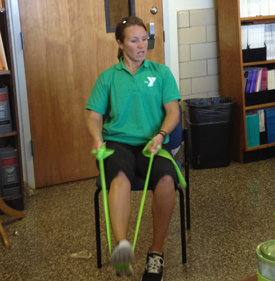
The “Get Fit at CMHSR: One Step at a Time” wellness program started from a simple idea. “We wanted something everyone could participate in, no matter what their level of health and fitness to start with,” said Carole Puleo, project assistant II at UMMS’s Center for Mental Health Services Research (CMHSR) at Worcester State Hospital. Puleo’s partner on the project was Linda Harrington, academic administer in Department of Psychiatry and the CMHSR/Communities of Care.
The two women tried to identify the easiest lifestyle changes with the potential for the biggest impact. “Our director Carl Fulwiler is all about mindfulness and wellness,” Harrington said. “He had been asking what was available to help our staff stay healthy.”
Puleo and Harrington combined a bit of drama, some color, and tips from professionals to put together a fun, six-week program that brought members of the team together to share health information and motivation.
The first session, which was held in late May, focused on drinking eight glasses of water a day. Puleo and Harrington bought brightly colored reusable water glasses for everyone and assembled them on a table in the conference room. “We tried to build up their curiosity by making it a little mysterious,” Puleo said. “We covered the window on the door so they couldn’t see what was inside and we didn’t tell them what we were going to talk about.”
The glasses were a big hit, as well as the idea of drinking more water. “Pretty soon, we noticed that even some of the least-active people were now moving around more, even if just to get up and get that glass of water,” Harrington said. Because they were doing it as a group, the members also felt a certain esprit de corps. “It’s easier sometimes to take these kinds of steps together,” she added. And that may be helping to keep people motivated. “Everyone still has their cups, and people have kept drinking the water,” Puleo said.
Their next goal was to encourage staff to eat an apple a day, and then they introduced them to exercise bands. The program was paused for the summer after the fourth session, which was on stress busters. “We’d like to start it up again in the fall if there is still interest,” said Harrington. “And we might do the next session on something more unusual, such as aromatherapy.”
For each session, the pair put together a tip sheet and gave the participants an inexpensive, fun and easy-to-use accessory—the glasses, fresh apples and other healthy snacks, fluorescent lime-colored stretch bands, and some fuzzy stress balls. During the meetings, they shared resources and participants could chat about their own experiences or ask questions. For the exercise session, a fitness consultant explained how to use the bands while sitting in your office chair. She also provided an easy-to-follow video.
The stress-busters session might have been the highlight of the program. Besides giving the cute little stress balls, they distributed a list of You Tube’s 50 top videos, which put such amusing classics as “David After Dentist,” “Sneezing Panda” and “Keyboard Cat” just a click away. “We underestimate the power of laughter,” Harrington said. “But it’s really a great stress buster.”
Overall, Puleo and Harrington felt the program was a success. People “kept coming back,” Harrington said. “Even the young people were engaged and having fun with it.”